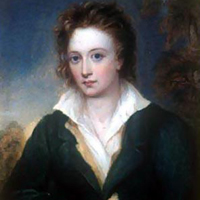Mont Blanc: Lines Written in the Vale of Chamouni by P. B. Shelley: Summary and Analysis
Mont Blanc: Lines Written in the Vale of Chamouni often quoted as Mont Blanc is an ode by one of the most famous Romantic poets P. B. Shelley in 1816 during his visit to the Chamonix Valley. Published posthumously in 1822, this poem deals with the nature and its power and the ability of the human mind to comprehend the truth behind nature.

P. B. Shelley (1792-1822)
The poem begins with the first person speaker talking to the majestic mountain. He regards the mountain as the 'everlasting universe of things'. The imagination of the human being is frail and weak in comparison to the marvelous mountain. Then the speaker goes on praising the mountain with its cliffs, trees, ice and stone, and for its sublimity. The mountain is big enough to capture in thought and the poetic persona feels dizzy. He tries to understand the mountain as a whole, but he cannot and this feeling of inability to understand the mountain goes on. On the contrary, the mountain remains unmoved, still, and stronger. The mountain and nature are too huge to be resorted to the mythology. The speaker feels only the wise can see nature’s reality. The spellbound speaker goes on talking about the things of nature like river, lakes, forest, ocean, flood, hurricane, earthquake and many more and accepts the permanence of these things. The power of nature or the mountain is just like an unstoppable glacier. In the final stanza, the speaker reveals the truth that all the power or the spirit of nature is in the mountain: Mont Blanc. It stands high with all its majestic features of endurance and immortality. The speaker realizes that the mountain teaches him with great lessons of hardships, strength, endurance and victory. Knowledge of such things fills his mind with a welcoming silent solitude.
As a romantic poet P. B. Shelley celebrates the nature and its power. He depicts the relationship of human beings and nature. The human works vanish in the course of time, even the life is bound to extinguish. So, all the human works and lives are temporary and subject to decay. Where the life goes after the death, we cannot exactly say. Focusing on the decay of human life, the poet says:
‘all things that move and breathe with toil and sound are born and die: revolve, subside and swell.’
These lines indicate the transience and mortality lying with human beings. In contrast, the work of the nature always remains there with the same power. Its sound, motion, and shape remain the same for ages. Celebrating the power of nature, the poet says, ‘Mont Blanc yet gleams on high: the power is there, the still and solemn power of many sights.’ Making a comparison between man and nature, the speaker places nature above the human works and human beings.
Nature develops fantasy, imagination and wild thought and those thoughts take rest in the form of the poetry. Like his contemporary romantics, Shelley regards nature as the source of creativity or the work of art. One power of nature as the poem indicates is to promote art and creativity.
Shelley is found as a rebellious figure in this poem. Whenever he looks at the nature, it promotes the wild thoughts and the disturbing doubts. He starts burning from within, remembering the injustice of the society and those wild thoughts lead him to reverse the codes of fraud and woe. Looking at the Nature, he makes a commitment to destroy the oppressive structure. This commitment reflects Shelley’s attitude towards nature. For others romantics, nature is the source of harmony, pleasure or joy, but for him the power of nature lies in developing the rebellious attitude. But he argues that all the people will not be able to read the message of nature. Only the wise and great ones can feel and interpret nature well. Probably with this statement, Shelley is indicating towards himself, which is sometimes interpreted as the egotistical sublime of the British Romantics.
Shelley is mainly concerned with a problem of understanding the nature and its power in this poem. He uses the river as a metaphor. Though the river is small and feeble, it has the ability to cut through the mountain. It travels down with a destructive force from its guided ways to the dizzying gorge. It cannot be tamed and cannot be stopped. The wishes his thoughts to be like the river untamed and unstoppable. The river, though, is a life of all the species from desert to the ocean, has the power to destroy everything that man has created.
